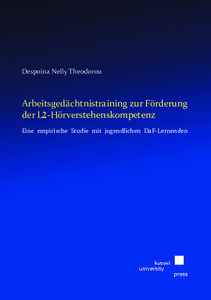| dc.date.accessioned | 2023-05-25T15:19:10Z | |
| dc.date.available | 2023-05-25T15:19:10Z | |
| dc.date.issued | 2016 | |
| dc.identifier | doi:10.19211/KUP9783737602198 | |
| dc.identifier.isbn | 978-3-7376-0219-8 (e-book) | |
| dc.identifier.uri | urn:nbn:de:0002-402192 | |
| dc.identifier.uri | http://hdl.handle.net/123456789/14764 | |
| dc.description | Zugleich: Dissertation, Universität Kassel, 2016 | ger |
| dc.language.iso | ger | ger |
| dc.publisher | kassel university press | |
| dc.rights | Urheberrechtlich geschützt | |
| dc.rights.uri | https://rightsstatements.org/page/InC/1.0/ | |
| dc.subject.ddc | 370 | |
| dc.subject.ddc | 430 | |
| dc.title | Arbeitsgedächtnistraining zur Förderung der L2-Hörverstehenskompetenz | ger |
| dc.type | Buch | |
| dcterms.abstract | Working memory (WM) is necessary for making sense of any aural information whether linguistic, lexical or pragmatic. It is also needed to mentally manipulate this information, to draw inferences, support conclusions, to ascertain cause and effect and combine old and new information in novel ideas. Particularly foreign language (L2) listening puts heavy demands on working memory because L2 listeners are forced to devote more cognitive resources to overcome their limited lexico-grammatical knowledge. Given that working memory can be improved by training, quite a number of studies have investigated the transfer of working memory training to language comprehension. The limited but convincing evidence of the current research suggests that process based working memory training programs have a positive effect on academic abilities, particularly in the domain of L1 reading.
The present study examines if there is a correlation between updating tasks and L2 listening and whether adaptive working memory training can benefit the L2 listening ability in typical adolescent foreign language learners. 77 Greek participants (mean age 14.4) were tested in a pretest/posttest/follow up design. Over 10 training sessions two training groups (n = 24 and n = 26) performed adaptive working memory training. Pretest, posttest and follow up included updating tasks (running memory, keep track) and a standardized German listening test (DSD). The results are interpreted according to Miyake et al. (2000, 2012). No correlation between updating and L2 listening was found. Compared to a passive control group (n = 27) both training groups significantly improved their performance both in the trained working memory task and in the L2 listening test, providing further evidence for training-related improvements in the domain of academic abilities. Transfer to the L2 listening comprehension was maintained over 4 months in one of the two training groups. The analysis of individual differences indicated compensatory effects with larger gains in adolescents with lower working memory scores in the pretest. The results are discussed in the context of WM training as a device for enhancement of L2 listening ability and school performance in general. | eng |
| dcterms.accessRights | open access | |
| dcterms.creator | Theodorou, Despoina Nelly | |
| dcterms.dateAccepted | 2016-06-10 | |
| dcterms.extent | 322 Seiten | |
| dc.contributor.corporatename | Kassel, Universität Kassel Fachbereich Geistes- und Kulturwissenschaften | ger |
| dc.contributor.referee | Aguado Padilla, Karin (Prof. Dr.) | |
| dc.contributor.referee | Schubert, Torsten (Prof. Dr.) | |
| dc.publisher.place | Kassel | |
| dc.relation.isbn | 978-3-7376-0218-1 (print) | |
| dc.subject.swd | Deutsch | ger |
| dc.subject.swd | Fremdsprache | ger |
| dc.subject.swd | Hörverstehen | ger |
| dc.subject.swd | Arbeitsgedächtnis | ger |
| dc.title.subtitle | Eine empirische Studie mit jugendlichen DaF-Lernenden | ger |
| dc.type.version | publishedVersion | |
| kup.iskup | true | |
| kup.subject | Geisteswissenschaft | |
| kup.typ | Dissertation | |
| kup.institution | FB 02 / Geistes- und Kulturwissenschaften | |
| ubks.nodoigen | true | |
| kup.binding | Softcover | |
| kup.size | DIN A5 | |


